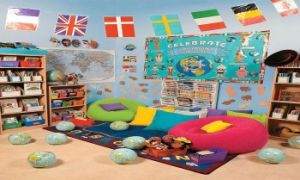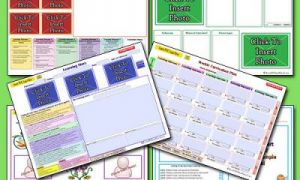Supporting the mental health of toddlers and preschoolers is crucial for their overall development. The following article provides information on effective strategies including Building Trusting Relationships, Teach Social Emotional Skills, Encourage Positive Interactions, Create A Multi Rich Environment, Professional Development and more.
Build Trusting Relationships
- Create a Safe Environment: Ensure that children feel safe and secure in the classroom. This involves being consistent, reliable, and responsive to their needs.
- Show Empathy and Understanding: Acknowledge children’s feelings and help them express their emotions in healthy ways.
Teach Social-Emotional Skills
- Use Children’s Books: Incorporate stories that discuss emotions and social situations to help children understand and manage their feelings.
- Model Appropriate Behaviors: Demonstrate positive social interactions and emotional regulation.
Encourage Positive Interactions
- Promote Cooperative Play: Encourage activities that require children to work together, share, and take turns.
- Praise Positive Behavior: Reinforce good behavior with praise and positive reinforcement.
Create a Material-Rich Environment
- Stimulate Social Interactions: Provide a variety of materials and activities that encourage children to interact and engage with each other.
Support Emotional Regulation
- Teach Coping Skills: Help children learn techniques to calm themselves, such as deep breathing or using a quiet corner.
- Be a Role Model: Show children how to handle emotions by managing your own stress and reactions.
Professional Development
- Stay Informed: Regularly attend workshops and training sessions on early childhood mental health to stay updated on best practices.
These strategies can help create a supportive and nurturing environment that promotes the mental health and well-being of young children.
Further Reading
Promoting Empathy In Children - The following article provides strategies for promoting empathy in children.
Linking Social/Emotional Development To EYLF 0 - 5 Years - Due to the rapid nature of brain development in early childhood, the quality of early experiences deeply impacts their emerging selfhood and how they respond to the world around them for the rest of their life. This can be broadly thought to constitute the core of their social and emotional development and here is how it is linked to the EYLF.
Calm Down Techniques For Over Responsive Children - The following article provides calm-down strategies for over-responsive children that you can use within the learning environment.
Calm Down Box For Children - The following article provides a list of self-regulates that can be included inside a calm down box.
Interest Areas In A Learning Environment - The following article provides information on What Are Interest Areas and Their Benefits, Common Interest Areas, Guidelines For Planning Interest Areas and more.







 As an Educator in Australia, your pay rate falls under the Children’s Services Award 2010. This award states the minimum amount that an employer can
As an Educator in Australia, your pay rate falls under the Children’s Services Award 2010. This award states the minimum amount that an employer can When working as a qualified Early Childhood Teacher (with a university degree) within a service, your rate of pay will come from the Educational Services
When working as a qualified Early Childhood Teacher (with a university degree) within a service, your rate of pay will come from the Educational Services When working as a Diploma Qualified Educator your pay rate is from the Children's Services Award 2010. This Award states your minimum rate of pay
When working as a Diploma Qualified Educator your pay rate is from the Children's Services Award 2010. This Award states your minimum rate of pay When working as a Cert 3 Qualified Educator, your pay rate is from the Children's Services Award 2010. This Award states your minimum rate of
When working as a Cert 3 Qualified Educator, your pay rate is from the Children's Services Award 2010. This Award states your minimum rate of Educational Leaders play a crucial role in their early childhood service by ensuring that the educational program aligns with best practices and supports the holistic
Educational Leaders play a crucial role in their early childhood service by ensuring that the educational program aligns with best practices and supports the holistic In early childhood education and care, ratios are more than a technicality—they are a frontline safeguard. Every child deserves responsive supervision, emotional connection, and developmental
In early childhood education and care, ratios are more than a technicality—they are a frontline safeguard. Every child deserves responsive supervision, emotional connection, and developmental With the new national child safety reforms kicking in on 1 September 2025, early childhood services like yours have a real opportunity to lead the
With the new national child safety reforms kicking in on 1 September 2025, early childhood services like yours have a real opportunity to lead the Here’s a comprehensive Mobile Phone and Smart Watch Policy tailored for early childhood education and care (ECEC) services in Australia, aligned with the latest 2025
Here’s a comprehensive Mobile Phone and Smart Watch Policy tailored for early childhood education and care (ECEC) services in Australia, aligned with the latest 2025 The Sea of Fish Challenge is a national initiative that invites children, educators, families, and communities to create and display fish artworks as a symbol
The Sea of Fish Challenge is a national initiative that invites children, educators, families, and communities to create and display fish artworks as a symbol Across the early childhood education and care sector, educators are sounding the alarm: current staffing ratios are insufficient to deliver safe, meaningful, and developmentally appropriate
Across the early childhood education and care sector, educators are sounding the alarm: current staffing ratios are insufficient to deliver safe, meaningful, and developmentally appropriate


